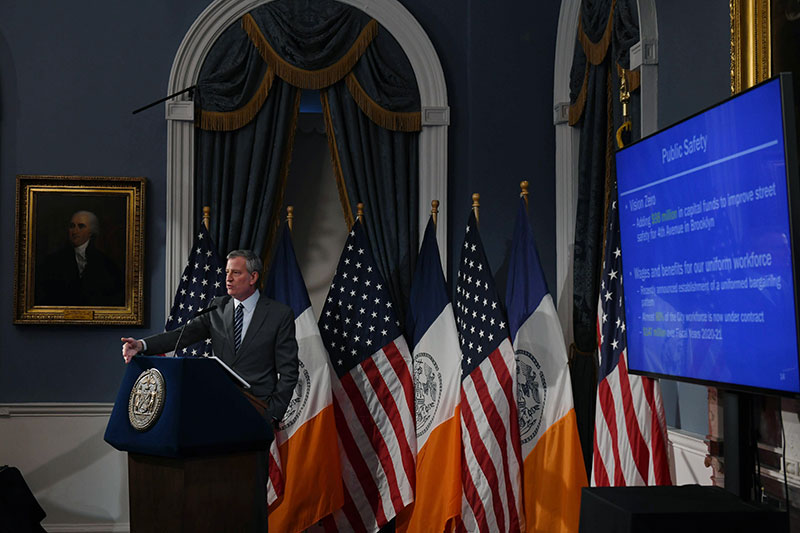Secondary Navigation
Fact Sheet: Mayor de Blasio Releases Preliminary Budget for Fiscal Year 2021
January 16, 2020
“In planning for the next year, we are facing an unprecedented $6 billion State budget gap. Medicaid cuts could reverse years of progress at NYC Health + Hospitals and impact health care for the most vulnerable. We will work with our partners in Albany to continue to find savings while fighting to protect health care for all New Yorkers.”
- Mayor Bill de Blasio
Today, Mayor Bill de Blasio presented New York City’s Preliminary Budget for Fiscal Year 2021 (FY21).
The FY21 Preliminary Budget is $95.3 billion. This budget:
- Demonstrates caution in the face of a $6 billion State budget gap
- Is fiscally responsible — the budget is balanced and maintains historic levels of reserves
- Makes critical new investments that are all paid for by savings and continue to make New York City the fairest big city in America
Growth in the budget is lower than in previous years, at 2.7%. This is primarily driven by labor settlements and benefits, which make up almost two-thirds of the growth, debt service, education, and criminal justice mandates. The Preliminary Budget reflects an increase in tax revenues with a yearly growth rate of 4.6% in FY20. Our FY21 revenue estimate is cautious at 2.0% growth, reflecting signs that the local and national economies are slowing.
Read the FY21 Preliminary Budget here.
A NEW REALITY
This budget was crafted in light of New York State’s $6 billion budget gap, of which $4 billion is a Medicaid deficit. This is the largest State deficit that has occurred during this Administration, and could mean significant cuts to the New York City budget.
NYC Health + Hospitals (H + H), would bear the brunt of these cuts. The hospital system, which serves over one million New Yorkers annually - including some of the most vulnerable - has achieved ambitious goals through the Administration’s transformation plan. This includes closing over $1 billion of its budget gap, meeting planned revenue and expense goals, and improving collection and billing practices. Now, more patients have primary care doctors, expanded access to expert medical care, and their appointment wait times have been reduced. Cuts to the H + H budget would jeopardize this financial recovery and care for New Yorkers.
Together with allies in Albany, the City will fight cuts and work with the State on changes to their Medicaid system that will provide savings.
Additionally, the MTA continues to demand more out of New York City taxpayers— $3 billion to the MTA capital plan and $100 million more annually for Access-a-Ride, without addressing root causes of the problem.
RESPONSIBLE BUDGETING
Facing these challenges, New York City continues to demonstrate fiscal responsibility:
- Savings: In the Preliminary Budget, the City has achieved $714 million in savings across FY20 and FY21.
- New Spending Completely Offset: New spending of $441M in FY20 and $243M in FY21 is completely offset by savings.
- Maintains Historic Levels of Reserves: In the FY21 Preliminary Budget, and the financial plan out years, the City has set aside $1 billion in the General Reserve and $250 million in the Capital Stabilization Reserve, the latter of which was created by this Administration. The Retiree Health Benefits Trust fund currently has $4.7 billion, with $3.8 billion added as a result of actions taken by this Administration.
INVESTMENTS FOR CRITICAL NEEDS
The FY21 Preliminary Budget helps rebuild vital infrastructure across the city and funds crucial services that increase fairness and keep New Yorkers safe. All new expense spending is offset by savings. The City will:
- Provide wages and benefits to our uniformed workforce based on the recently established uniformed bargaining pattern, for a total investment of $147 million in FY20 and 21.
- In partnership with the City Council, renew our commitment to help low-income New Yorkers with their transportation needs by investing $106 million in FY21 in Fair Fares.
- Continue the mission of Vision Zero by investing $98 million in capital funds to improve street safety for pedestrians and cyclists on 4th Avenue in Brooklyn.
- Invest an additional $178 million in capital funds over FY21-23 in curb cuts citywide to improve street accessibility.
- Supplement a larger U.S. Army Corps of Engineers beach and bayside resiliency project with an additional $33 million in capital across FY20 and FY21 to reconstruct beach crossings with durable, sustainable materials and remove hazardous wooden jetties.
- Investing $12.9 million in capital funds in FY21 to make improvements at NYCHA community centers.
- Committing $1.8 million annually in FY21-23 to support community-based justice programming at the Community Justice Center in the Far Rockaways.
Media Contact
pressoffice@cityhall.nyc.gov
(212) 788-2958


